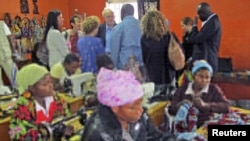Although the civil war in the Democratic Republic of the Congo ended in 2002, the war on women and girls continues. "Sexual and gender based violence in the Democratic Republic of the Congo, or DRC," wrote U.S. Ambassador-at-Large for Global Women's Issues, Melanne Verveer in a recent blog post, "includes the use of rape and sexual terror as a tactic of war in the conflict-affected eastern provinces, as well as pervasive violence against women and girls throughout the rest of the country."
Such systemic sexual violence not only destroys women and young girls, but also entire families and communities. Men and boys are also victims of abuse, though they are often overlooked as a vulnerable population.
The United States has developed a comprehensive strategy to address sexual and gender based violence, or SGBV, in the DRC. In partnership with the Congolese government and civil society, the U.S. government seeks to: reduce impunity for perpetrators of SGBV; increase prevention of and protection against SGBV for vulnerable populations; improve the capacity of the security sector to address SGBV; and increase access to quality services for survivors of SGBV.
The U.S. Government, through the U.S. Agency for International Development, or, USAID, and the Departments of State and Defense, funds a wide range of programs addressing SGBV in the DRC. USAID programs have provided care and treatment services for well over 100,000 SGBV survivors, including access to medical care, counseling and family mediation, social and economic reintegration support, as well as legal aid. Other programs seek to promote women's rights, acceptance of rape survivors and fight impunity through legal reform. However, said Ambassador Verveer, "it is clear that the low status of women in the DRC is a contributing factor to the high rate of sexual and gender-based violence in the county.
"The DRC cannot move ahead without the full inclusion of women politically . . . . economically, through agriculture and beyond, and socially, through a robust civil society movement.
"To achieve this, U.S. Government assistance programs in the DRC seek to promote women's participation in all spheres of political and economic life. Women are a powerful voice for peace and an instrument of development when given the opportunity," said Ambassador Verveer.
"Investing in women is not only the right thing to do; it's the smart thing to do."
Curbing DC's Gender-based Violence

Although the civil war in the Democratic Republic of the Congo ended in 2002, the war on women and girls continues.
















